Hey readers…
Online retail continues to grow fast, with nearly 23% of all retail purchases are expected to happen online by 2027.
From small businesses to established enterprises having the best e commerce website maker is more important than ever. But where do you start?
The answer lies in choosing the best ecommerce website builder, which simplifies setting up your store, managing payments, and shipping from the comfort of your home or office.
The ecommerce industry, currently valued at $8.80 trillion, is on track to double by 2029, driven by advancements in AI and machine learning. Voice commerce is gaining traction, and the digital world is evolving faster than ever.
As industry giants like Alibaba and Amazon lead the market, businesses must stand out by choosing the best ecommerce website builder reviews to help their stores succeed.
In fact, by 2027, Amazon is forecasted to lead the global ecommerce market with an astounding $1.7 trillion in sales.
If you want to grow a successful online store, choosing the best web builders for ecommerce is key. Whether you’re a small business owner or a large enterprise, finding the best ecommerce web builder can transform your online retail experience.
In this article, we’ll explore the top ecommerce website building companies and what makes them stand out.
What Is Ecommerce Website Builder Explained Here…
Best online ecommerce website builder is a platform that helps users create online stores without needing advanced technical skills. These ecommerce website makers or ecommerce site builder software provide tools to design, customize, and optimize websites for selling products.
Key Takeaways On Ecommerce Website Builders
- Selecting the best ecommerce website builder is essential for a successful online store, simplifying setup, payments, and shipping for businesses of all sizes.
- Key features in ecommerce site builder companies include mobile responsiveness, SEO tools, secure payments, and an intuitive interface to enhance usability and conversions.
- Referring to reviews of ecommerce website builders help businesses evaluate usability, scalability, security, and support, ensuring a reliable platform for long-term growth.
- Technical aspects like hosting, API integrations, and CMS capabilities are crucial when choosing ecommerce site builder software, allowing seamless scalability and third-party integrations.
- The best site for ecommerce helps businesses handle traffic surges, security, and system upgrades, ensuring a smooth shopping experience and long-term success.
Best Ecommerce Website Building Platforms Comparison
| Web Builders | Description | Pricing | Suits Best For |
|---|---|---|---|
| 1. Webnexs | Webnexs is the best ecommerce website builder software offering flexible, scalable solutions tailored to businesses. It’s known for its omnichannel experience and ability to integrate with multiple channels, making it ideal for businesses looking to future-proof their online store. | Custom pricing based on needs | Headless Commerce and Omnichannel Experience |
2. Wcart | Wcart is a user-friendly platform designed for simplicity and fast setups. It allows businesses, especially startups and small businesses, to create professional online stores quickly without coding knowledge. | Affordable plans, ideal for SMBs to enterprises | Simplicity and Fast Launches |
| 3. Shopify | Shopify is one of the most popular ecommerce platforms, known for its ease of use, large app marketplace, and built-in payment processing. It offers everything businesses need to build, manage, and grow their online stores. | Starts at $39/month with various plans | All-in-One Ecommerce Solution |
| 4. WIX | WIX is a versatile platform offering a drag-and-drop website builder. It’s especially useful for small businesses and creatives who need an easy-to-use platform for building visually appealing websites. | Starts at $27/month | Small Businesses and Creatives |
| 5.BigCommerce | BigCommerce is a powerful platform designed for growing businesses and enterprises. It offers scalability and built-in features to support complex ecommerce needs, including B2B functionality and multi-channel selling. | Starts at $39/month | Large-Scale and Enterprise Businesses |
Let’s explore on the best ecommerce website builder companies reviews more in detail below:
What Are the Best Ecommerce Website Builders for 2025?
Selecting the appropriate ecommerce website builder reviews is essential for establishing a successful online store.
- Webnexs
- Wcart
- Shopify
- Wix
- BigCommerce
- Magento
- WooCommerce
- Squarespace
Let’s explore the 8 top e commerce web builder options in the ecommerce market today.
1. Webnexs – Best Custom Ecommerce Solution for Headless Commerce and Omnichannel Experience
“Leading ecommerce website maker with customizable and scalable solutions for unique needs.”
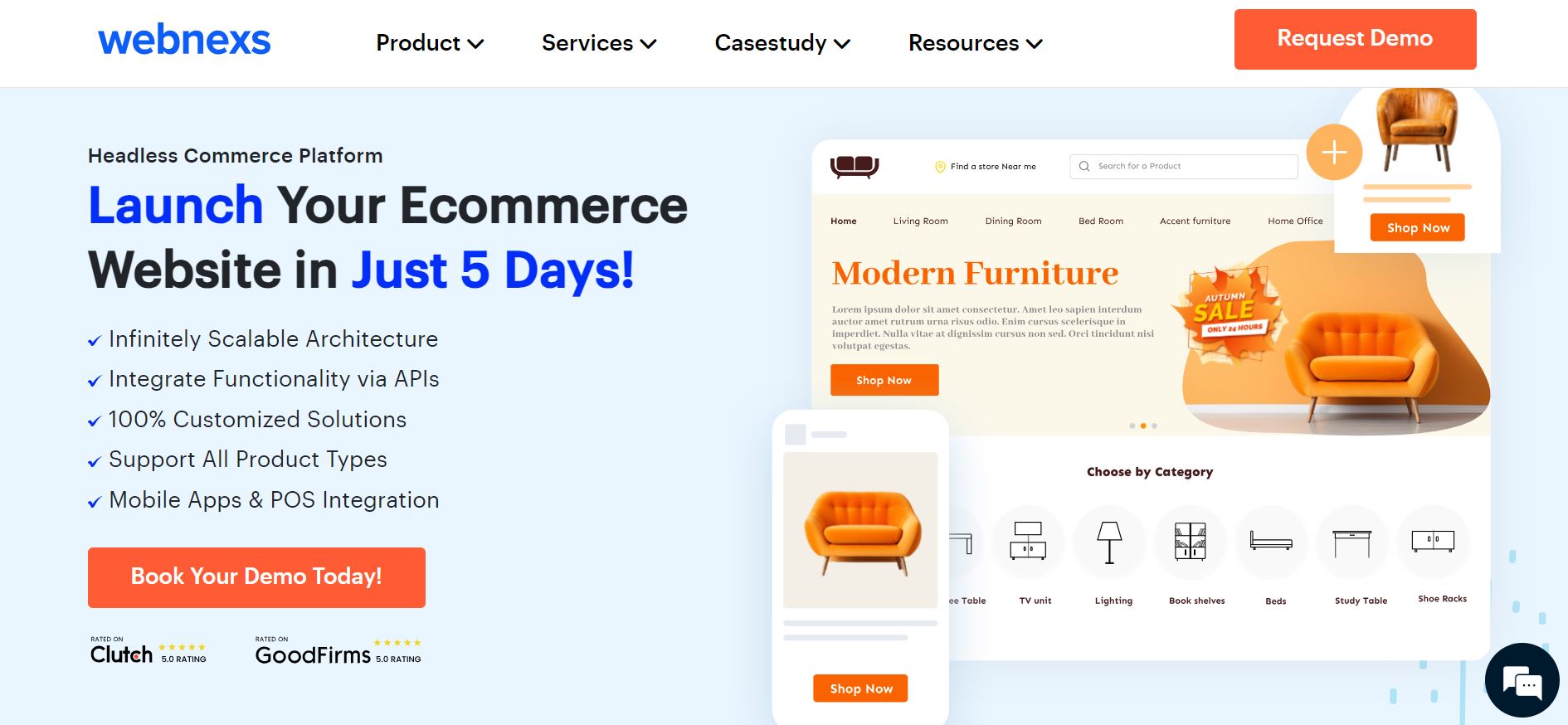
Webnexs is the best ecommerce site builder, known for its comprehensive solutions and user-friendly interface. With over 10+ years of experience, Webnexs has successfully delivered 200+ web and app projects across 50+ countries.
With a dedicated team of 50+ tech developers, Webnexs ensures top-notch quality and continuous innovation. Their commitment to customer satisfaction is reflected in a remarkable 99% customer rating, and businesses benefit from 24/7 customer support for seamless operations.
Key Features
- Advanced product management tools
- Secure payment options
- SEO-friendly features for better visibility
- Mobile-friendly design for the best viewing experience on all devices
- Multi-currency and multi-language support
- Outstanding customer support to help with any questions or problems
Benefits
- Enables businesses to build an advanced online presence
- Increases sales and revenue with advanced ecommerce features
- Provides flexibility and scalability to accommodate business growth
- Offers peace of mind with reliable security features and ongoing support
- Enhances customer experience with intuitive design and navigation
Ideal for: Businesses looking for a headless ecommerce solution to future-proof their online store and expand across multiple channels.
User Review
⭐️⭐️⭐️⭐️⭐️
“Incredibly talented team to work with. Webnexs exceeded our expectations in developing our multi-vendor e-commerce platform. They understood our needs and delivered beyond what we imagined!”
Is Webnexs worth it?
Yes, if you are in need of a highly customizable and developer friendly platform. Webnexs excels in all sorts of ecommerce platforms. A best builder for all sorts of business levels. It’s not the easiest platform for beginners, but its flexibility makes it a strong choice for complex or unique needs.
Who Do We Recommend Webnexs for?
Webnexs is perfect for businesses that require highly customized ecommerce solutions. Its flexibility and advanced features make it ideal for companies that have specific, complex needs and access to a technical team for full customization.
2. Wcart – Best Ecommerce Platform for Simplicity and Fast Launches
“Top website builders for ecommerce with simple setup and customization.”
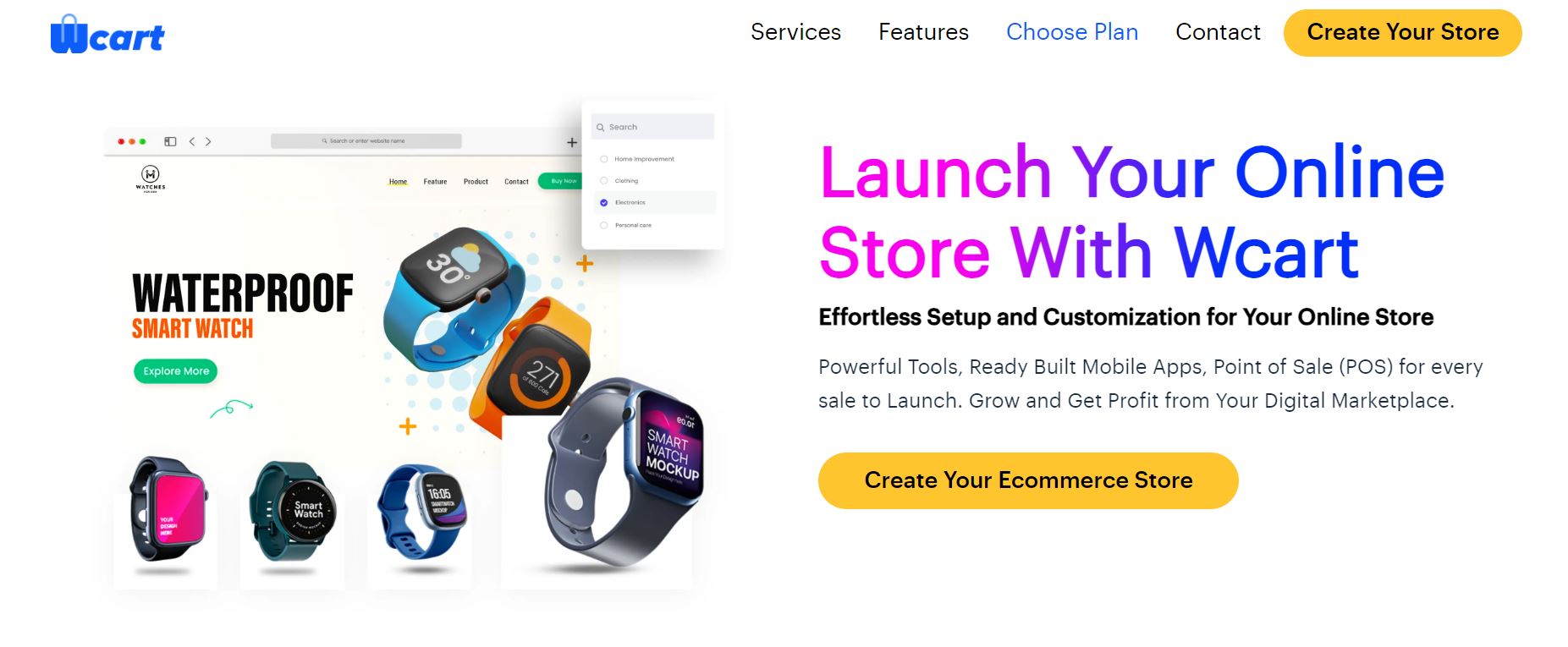
Wcart is a best website builder for ecommerce known for its user-friendly interface and advanced features. It provides users with an easy-to-use platform to create professional-looking online stores without coding knowledge.
The company has built a strong presence in the ecommerce ecosystem, working with a wide range of clients across industries.
With a commitment to continuous improvement and innovation, Wcart’s dedication to excellence is evident in its expansive offerings and loyal customer base.
Wcart stands as a trusted authority in the ecommerce space, with a strong network of developers and experts contributing to its ongoing success. Their platform’s capabilities and support continue to help businesses expand their reach and maximize their potential.
Key Features
- Drag-and-drop website builder for effortless customization
- Payment gateway integration for secure transactions
- Multi-language and currency support for global reach
- Built-in SEO tools to enhance online visibility
- Analytics dashboard for monitoring sales and performance metrics
Benefits
- Simplified website creation process with drag-and-drop functionality
- Secure payment processing to instill trust and confidence in customers
- Expanded market reach with multi-language and currency support
- Improved search engine rankings with built-in SEO features
- In-depth analytics for informed decision-making and optimization
“Ideal for: Small business and startups which needs a quick and easy to launch their online store.“
User Review
⭐️⭐️⭐️⭐️⭐️
“Create a Professional Web Store Quickly with Integrated Payment Gateways”
Is Wcart Worth it?
Wcart is worth considering if you want a fresh, cloud-based ecommerce platform with modern features. It is one of the best SaaS platform, which offers a clean, intuitive and advanced multi-store capabilities.
Who Do We Recommend Wcart for?
It’s easy-to-use interface and scalable features make it a great option for startups and small businesses to start an online store instantly. Multi-store and multi-vendor capabilities helps the businesses to grow rapidly.
3. Shopify – Best Ecommerce Website Building Platform for Your Solution
“Top rated ecommerce builder with a user-friendly interface and extensive app integrations.”

Shopify is one of the best ecommerce builders, renowned for its user-friendly interface and comprehensive set of features. Founded in 2006, it has empowered millions of entrepreneurs globally to create and grow their online businesses.
Shopify offers an advanced platform that includes everything from website creation to payment processing, inventory management, and marketing tools.
With features like customizable store themes, multi-channel selling, and integrated POS systems, Shopify allows businesses to seamlessly manage their online presence.
Moreover, Shopify’s extensive app store and 24/7 customer support further enhance its reputation as a leading ecommerce platform for businesses of all sizes.
Key Features
- Easy-to-use drag-and-drop ecommerce builders
- Extensive library of customizable templates
- Secure payment processing with Shopify Payments
- Integration with over 6,000 apps and plugins
- 24/7 customer service is available via phone, email, and live chat
Benefits
- Simplified website creation process, even for beginners
- Professional-looking storefronts with customizable templates
- Seamless integration with third-party apps for added functionality
- Secure payment processing to protect customer data
- Personalized customer service available to address any questions or issues
Ideal for: Businesses of all sizes looking for a comprehensive ecommerce platform.
User Review
⭐️⭐️⭐️⭐️⭐️
“The only real option to start up an ecommerce site”
Is Shopify worth it?
Absolutely. Shopify is one of the most trusted and widely used platforms in the world. Its massive app store, built-in hosting, and beginner-friendly UI make launching and running a store very accessible.
Who Do We Recommend Shopify for?
Shopify’s comprehensive tools, intuitive interface, and ability to support large inventories make it a solid choice for businesses that have established products and a growing demand. It’s perfect for businesses with selling both physical and digital goods.
4. WIX – Best Ecommerce Website Builder for Small Businesses
“Easy-to-use drag-and-drop website builder ideal for beginners.”

Wix is the best web builder for ecommerce known for its simplicity and versatility. Founded in 2006, Wix has become a go-to platform for individuals and businesses looking to create stunning websites without coding knowledge.
The goal of WIX was to provide an accessible platform for anyone to design and manage their online presence. Since then, Wix has grown into a global leader in website building, serving millions of users worldwide.
With a team of over 5,000 employees across 12 countries, the company continues to innovate and evolve its platform to meet the needs of individuals, agencies, and businesses.
Key Features
- Drag-and-drop website builder with customizable templates
- Built-in ecommerce functionality with secure payment processing
- SEO tools to improve online visibility and rankings
- Responsive design for ideal viewing on any device
- App Market with hundreds of apps to enhance website functionality
Benefits
- Intuitive drag-and-drop interface for easy website creation
- Integrated ecommerce features for selling products online
- Improved search engine visibility with built-in SEO tools
- Easy integration with third-party applications to enhance functionality
- Mobile-responsive design ensures a consistent user experience across devices
Ideal for: Small businesses, artists, and freelancers seeking best ecommerce websites builders with creative control
User Review
⭐️⭐️⭐️⭐️⭐️
“Wix – a simple, no-code solution to design and host your own website.”
Is Wix Worth it?
Yes, especially for those who prioritize design and ease of use. Wix lets you build a visually stunning site quickly with drag-and-drop tools. While not as advanced in ecommerce as others, it works well for smaller stores.
Who Do We Recommend Wix for?
Its straightforward backend and comprehensive set of sales features make it a fantastic choice for businesses that sell digital and physical products. But it is not well suited for businesses that want to scale.
5. BigCommerce – Best Ecommerce Platform for Large-Scale and Enterprise Businesses
“Responsive ecommerce builder with advanced tools for growth and adaptable design.”

BigCommerce is a leading ecommerce platform trusted by businesses of all sizes. Founded in 2009, BigCommerce offers a comprehensive solution for creating and managing online stores with ease.
Headquartered in Austin, Texas, the company has expanded to serve customers in over 150 countries. BigCommerce is driven by innovation and a commitment to helping businesses scale.
The company prides itself on its core values—customers first, integrity, and collaboration. BigCommerce is an ideal platform for businesses looking to grow their online presence. Whether you’re a small startup or a large enterprise, BigCommerce provides the tools and support you need to succeed in ecommerce.
Key Features
- Customizable storefront website builder design with drag-and-drop functionality
- Secure payment processing with multiple payment gateways
- Integrated SEO tools to boost search engine visibility
- Integration with leading marketing and analytics tools
- Scalability to accommodate business growth and expansion
Benefits
- User-friendly interface for easy website customization
- Secure payment processing to protect customer information
- Enhanced search engine visibility with built-in SEO tools
- Integration with marketing and analytics tools for data-driven decisions
- Ability to scale to accommodate the growth of businesses
Ideal for: Large businesses requiring best ecommerce site builder solutions for scalability and customization.
User Review
⭐️⭐️⭐️⭐️⭐️
“A Complete E-commerce Solution for Growing Businesses”
Is BigCommerce Worth it?
It’s a top contender for enterprise businesses. BigCommerce offers powerful native features (like B2B tools and SEO options) out of the box, which means less reliance on third-party apps.
Who Do We Recommend BigCommerce for?
BigCommerce is best for businesses that are in need of advanced ecommerce functionality. This platform is especially suited for mid-sized businesses with complex product catalogs, B2B needs, and those that want to expand into international markets.
6. Magento – Best for Custom Ecommerce and Enterprise-Level Solutions
“Best ecommerce store builder offering the best open-source platform with advanced customization.”

Magento is a powerful open-source ecommerce platform trusted by businesses worldwide. Founded in 2008, Magento offers a flexible solution for creating and managing online stores with advanced features.
Acquired by Adobe in 2018, Magento empowers businesses of all sizes to create highly customizable online stores, enabling them to deliver exceptional digital shopping experiences.
Magento offers a flexible and scalable solution for businesses looking to create and manage online stores.
With its advanced features and customization options, Magento empowers businesses to build successful ecommerce websites that drive growth and revenue.
Key Features
- Customizable storefront website builder design with themes and templates
- Product management tools for easy inventory management
- Secure payment processing with multiple payment gateways
- Integration with third-party extensions and plugins
Benefits
- Offers a highly customizable and scalable platform
- Provides a personalized shopping journey using real-time data
- Allows for fast development with pre-built components and low-code tools
- Handles high-volume transactions and complex product catalogs
- Efficiently manages both B2B and B2C models from a single platform
Ideal for: Enterprises and businesses with complex needs that require a customizable ecommerce site builder.
User Review
⭐️⭐️⭐️⭐️⭐️
“One of the best platform for ecommerce website”
Is Magento Worth it?
If you have the budget and dev support, yes its worth it. If you choose Magento, you need to go under a learning curve and higher costs for hosting and development.
Who Do We Recommend Magento for?
Magento is best for large businesses with highly specific needs and large catalogs. If your store requires custom features to scale without limits, then Magento is the right choice.
7. WooCommerce – Best Ecommerce Website Building Platform for WordPress Users
“Flexible ecommerce builder software as a WordPress plugin for complete control.”

WooCommerce is a popular ecommerce plugin for WordPress, offering businesses a flexible and customizable platform for selling products online.
Launched in 2011, WooCommerce has quickly become one of the most widely used ecommerce solutions globally.
With more than 3 million active installations worldwide, WooCommerce has consistently demonstrated its expertise by serving businesses across a wide array of industries.
Its open-source nature and seamless integration with WordPress have made it the platform of choice for entrepreneurs and enterprises looking for a customizable, scalable ecommerce solution.
Key Features
- Seamless integration with WordPress websites
- Customizable design with themes and templates
- Extensive plugin library for additional functionality
- Secure payment processing with multiple payment gateways
- Scalability to accommodate businesses of all sizes
Benefits
- Fully customizable and open-source with control over designs, features and functionalities
- Supports multichannel selling across platforms
- Scales effortlessly from small startups to enterprise-level businesses
- Offers hundreds of extensions to add advanced features
Ideal for: Businesses already using WordPress that want an easy-to-implement ecommerce web builder.
User Review
⭐️⭐️⭐️⭐️⭐️
“Solid and scalable platform for e-commerce”
Is WooCommerce Worth it?
Definitely. As it is free to start, highly customizable and can integrate with WordPress effortlessly. It’s perfect for those who want control over every aspect of their store.
Who Do We Recommend WooCommerce for?
WooCommerce is great for small to medium-sized businesses, especially those already using WordPress. It’s best suited for businesses that want a simple, customizable platform with low initial costs. If you’re a beginner starting ecommerce business and need a simple store, then go for it.
8. Squarespace – Best Website Builder for Online Store
“Premier website builder with ecommerce, offering elegant templates and built-in ecommerce features.”

Squarespace is a popular website builder with ecommerce known for its elegant designs and user-friendly interface. Established in 2004, Squarespace provides a straightforward yet powerful platform for building beautiful websites and online stores.
With millions of websites created on its platform, Squarespace has firmly established itself as a leader in empowering entrepreneurs and creatives to launch their online presence with elegance and ease.
Driven by a vision to make entrepreneurship accessible to all, Squarespace offers a platform that combines sophisticated design with user-friendly tools, enabling individuals to build beautiful, functional websites and ecommerce stores.
The company’s commitment to quality design has earned it consistent recognition, including accolades for being a top workplace and offering exceptional benefits.
Key Features
- Beautiful templates designed for ecommerce
- Drag-and-drop website builder for easy customization
- Integrated ecommerce functionality with secure payment processing
- SEO tools to improve online visibility and rankings
Benefits
- Provides lots of built-in ecommerce tools
- Mobile optimized designs for seamless shopping experience
- Platform includes SSL encryption and integrates with trusted payment processors
- Offers email campaigns, SEO tools, and social media integrations
- 24/7 customer support through live chat and email
Ideal for: Designers, photographers, and businesses focused on visual branding.
User Review
⭐️⭐️⭐️⭐️⭐️
“Squarespace – Ultimate solution for your online business”
Is Squarespace Worth it?
It suits especially for creatives and service-based businesses. You can launch an simple online store quickly as it combines elegant design with basic eCommerce functionality.
Who Do We Recommend Squarespace for?
Best for businesses with a small inventory. Such as artists selling digital downloads, photographers offering prints, or boutiques selling unique, curated items.
Read More: Best Strategies For Growing Your B2B Headless Commerce
What Makes the Best Ecommerce Website Builder?
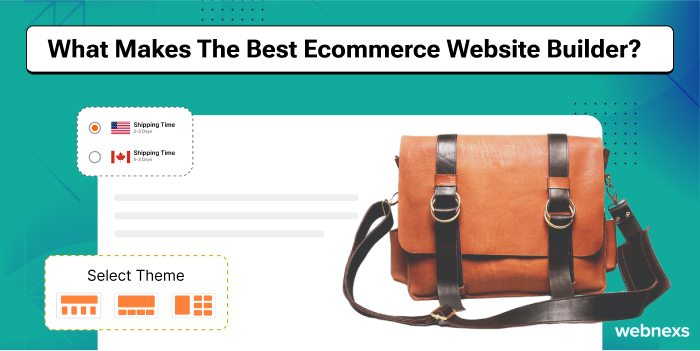
For enterprise or small and medium businesses wanting to sell products online, look for these five essential features in e commerce site builders.
1. Convenience
Navigability and intuitiveness in browsing through the website are imperative for persuading the users to prolong their time spent viewing the website.
2. Scalability
As traffic increases, the website needs to be able to accommodate the load, to convert leads and generate more traffic.
3. Integrability
Integration with other software to form a holistic platform that works together seamlessly from product listing to checkout purchase.
4. Security
It is categorized by high uptime and automatic backups to address uncertainty and unforeseen circumstances that could potentially cause a data breach.
5. Support
Resolution management is guaranteed 24/7 by the technical team. As issues arise, they are immediately attended to, ensuring integrity in business relationships.
What Features Should I Look for in an Ecommerce Website Building Platform?
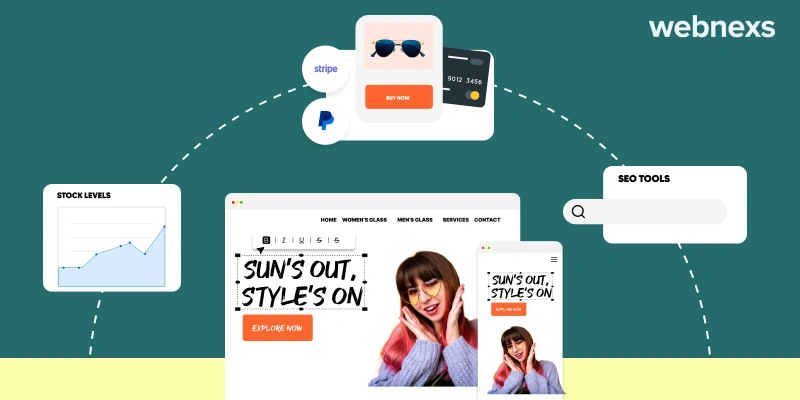
Choosing the right web builder ecommerce is crucial for the success of your online business. To create a seamless shopping experience and ensure business growth, there are several essential features you should prioritize. These features directly impact how efficiently your ecommerce site functions and how well it converts visitors into customers.
When evaluating platforms, you should consider the following:
1. Mobile Responsiveness
79% of mobile users have made a purchase online using their smartphones in the past six months
One of the most important features for ecommerce websites is mobile responsiveness. With over half of online shoppers using mobile devices, a responsive design ensures that your website looks great and functions smoothly on all screen sizes. Platforms with mobile-friendly ecommerce functionality are essential to maximizing sales and user engagement.
2. SEO Tools
93% of online experiences begin with a search engine, making SEO crucial for visibility
Having strong SEO tools built into your ecommerce site builder software is critical for driving organic traffic. Features like meta-tag customization, automatic sitemaps, and optimized URLs help your online store rank higher on search engines. The best ecommerce site builders make it easy to optimize your site for search engines, boosting visibility and clicks.
3. Secure Payment Systems
70% of consumers say that a smooth and secure payment experience would lead them to shop more often with a brand
A secure and reliable payment gateway is another key feature of an ecommerce platform. Look for top ecommerce builders that offer multiple payment options, such as PayPal, Stripe, and credit card processing. This enhances trust with your customers and reduces cart abandonment, improving conversion rates.
4. Product Management
70% of customers abandon a shopping cart if they find the product is out of stock
Efficient product management is vital for any web builder for ecommerce. A platform that allows you to easily organize and update product catalogs, set stock levels, and offer promotions can help your store run smoothly. Best ecommerce website builders provide intuitive dashboards for managing your products and inventory.
5. User-Friendly Interface
38% of users will stop engaging with a website if the layout is unattractive
The best website builder for ecommerce should be easy to use, even for beginners. Look for platforms that offer drag-and-drop functionality and pre-built templates to make designing your site simple. Best ecommerce site builders for small businesses will offer flexible design options without needing advanced technical skills.
How Do I Choose the Right Ecommerce Website Platform for My Solution?

1. Simplicity in Usage
Did You Know?
A simple, intuitive interface increases customer retention by 80%
The cruciality of a user-friendly interface cannot be undermined, as it is the tangible touchpoint for a user of the site. Traffic can be generated easily with an easy-to-navigate platform, as it acts as a cushioning effect for users online. Once they become comfortable with this, it then facilitates exploring your website, by which they can be intrigued to understand all of your product offerings and gain information on all the functionalities of the site.
This, in turn, helps them make an informed decision to purchase. These users then become potential lead generators. As they consume so much knowledge, it is inherent that they will share it across their social circle, initiating word-of-mouth marketing. Now you might realize how important it is to work on the user interface!
2. Capabilities
Did You Know?
Advanced features like product variations and filtering can lead to 25-30% more sales
Inclusive of features and functionalities. While a white-label service provider, different products would offer different features and functionalities that cater to different needs. To select the right software provider, you need to evaluate your business requirements and check if it aligns with the ecommerce website building software platform.
All of these eventually come down to the information that you require and the usage of that information. But primarily it should support unlimited products, inventory management, and product variations. These key features should be integrated into the platform to run the platform.
3. Device Optimization
Did You Know?
59% of mobile users abandon slow sites
Make sure the software platform is well-suited to run on various devices. This is essential for enhancing user experience, increasing traffic and engagement, improving site performance, and deriving SEO benefits so that the website gains better visibility in search engines and ranks higher.
It also helps in reducing bounce rates, enabling faster load times, minimizing technical issues, and decreasing friction in terms of interaction barriers like scrolling or zooming. To eliminate such interruptions and ensure a seamless user experience, optimization is essential.
4. Security Compliance (SSL)
Did You Know?
43% of consumers abandon their purchase if the website lacks SSL encryption
Secure Sockets Layer (SSL) support is imperative for data protection when user information is fed to the e-commerce website, HTTP and other components transfer the information to the server.
This data is encrypted to prevent data breaches and unauthorized access to user information. This is a requirement for securing a reliable e-commerce platform reputation and ensuring ongoing online sales with credibility.
5. Product Support
Did You Know?
Good post-launch support increases customer loyalty by 70%
You will not be done with the software vendor once you have gone live with your e-commerce platform. Rather, for a period of up to six months (which may vary depending on the vendor), you will receive technical support for using the product.
This support is beneficial and should be fully utilized to gain knowledge about the software’s behavior and to operate it seamlessly. Acquiring technical knowledge is recommended to address issues as they arise. Staying connected with the vendor beyond the initial support period is also advisable for troubleshooting should any issues arise.
Read more: Best multi vendor platform for ecommerce
What Are the Key Technical Requirements When Choosing an Best Site for Ecommerce?
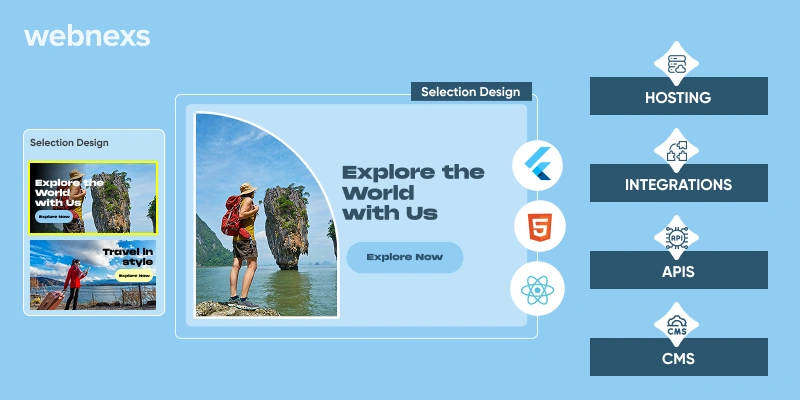
70% of eCommerce businesses report that failing to consider key technical requirements leads to decreased performance and higher operational costs
1. Hosting
Choosing the right hosting type is vital for determining your e-commerce platform’s performance, security, scalability, and cost, as it affects how effectively the site manages traffic, ensures uptime, and safeguards sensitive customer information.
2. Integrations
The software platform should support Third-party applications and services to offer complete flexibility in leveraging the platform, this also ensures that the platform is future-proof which relieves you from investing more when a shift takes place in the market responding to the demands of your users.
3. APIs
It is the capacity for different Application Programming Interfaces (APIs) to function together seamlessly. It enables systems or applications from various vendors or built on diverse technologies to communicate and exchange data efficiently. Compatibility is a key factor in deciding on the best ecommerce builder software platform.
4. Content Management System (CMS)
It should support flexible site management, including integrated SEO tools, version control features to monitor changes and revert to earlier versions if needed, and reporting tools to analyze content performance and user engagement. These are crucial aspects to consider for user-friendly content management.
Read more: Best seller ecommerce onboarding process
How Do I Find the Custom Ecommerce Solution for My Business Size?
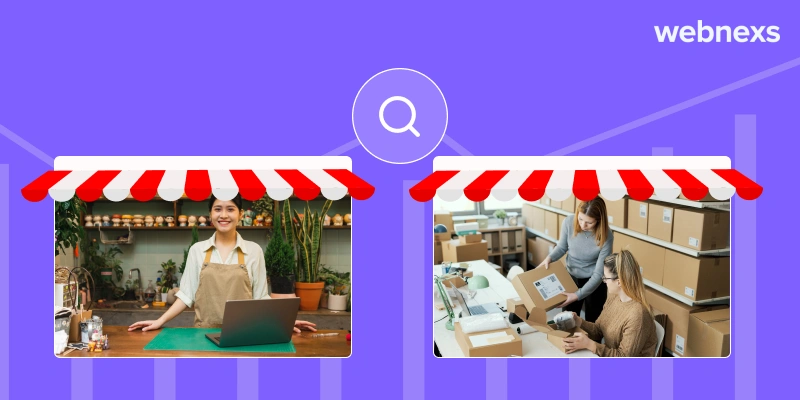
– For Small Businesses
For small businesses, choosing the right e commerce website builder is essential for growth while keeping costs low. The focus should be on affordability, user-friendly interfaces, and scalability to ensure the best ecommerce website creator platform can grow as your business expands.
Platforms like Wix, Weebly, and Shopify are great options for small businesses due to their easy-to-use templates, drag-and-drop builders, and budget-friendly plans. These builders come with integrated tools for SEO optimization, mobile responsiveness, and secure payment gateways, all essential for running a smooth online store.
– For Large Enterprises
Large enterprises require advanced enterprise ecommerce platforms that can handle high traffic, complex product catalogs, and offer enterprise-level features. The best options in this category include Webnexs, Wcart, and BigCommerce, all three are built to scale with business growth while offering advanced features like multi-channel integration, inventory management, and API support.
These platforms provide essential features for large businesses, including enterprise-grade security, multi-language support, and the ability to integrate with third-party software like ERP systems and CRM tools.
– For Specific Needs
When your business has unique requirements, selecting a website builder e commerce that addresses your specific needs is critical. For example, retailers will benefit from platforms like Webnexs or Wcart – best retail website builder, which offer features such as POS integration, inventory management, and shipping solutions. For creative industries or those in need of flexibility in design, platforms like Squarespace are ideal for their drag-and-drop interface and extensive design options.
For international businesses, platforms that offer multi-language support and global payment gateways are crucial to operate smoothly across different regions.
How to Choose the Best Site for Ecommerce Platform?

Selecting the right ecommerce website maker is crucial for the success of your online store. Each platform offers different features and pricing models, so it’s essential to choose one that aligns with your business needs. Here’s a guide to help you make the best choice:
- Consider Your Business Type and Size Assess the nature of your business—whether you’re selling digital products, physical goods, or online courses. The best online store builders should support your product offerings and scale with your business as it grows.
- Set a Budget and Plan for Growth Start by setting a budget and consider long-term scalability. Make sure to account for hidden costs such as apps, premium templates, and price increases as your business expands. Top ecommerce site builders offer affordable plans with room to grow.
- Evaluate Ease of Use Your confidence in building and managing an online store matters. Look for a user-friendly ecommerce website maker with drag-and-drop functionality and an intuitive backend dashboard. This ensures smooth website creation, even if you have limited technical skills.
- Check Multichannel Selling Capabilities If you plan to sell across various platforms, choose an ecommerce website provider that supports multichannel selling. Seamless integration with social media, marketplaces, and in-person sales will allow you to manage everything from one place.
- Focus on Customer Experience Prioritize features that enhance customer satisfaction, such as a smooth checkout process, multiple payment options, and tools to drive engagement. The best e commerce website builder comes with features like email marketing, customer reviews, and social media integration.
By considering your business needs, budget, and growth potential, you’ll be better equipped to select the best website builder for online store that helps you stand out in a competitive marketplace.
How Much Does an Ecommerce Website Cost?

The cost of building an ecommerce website varies depending on factors such as the chosen platform, customizations, additional features, and developer fees. On average, businesses can expect to invest anywhere from $1000+ to $5000+ in building their ecommerce website.
What Are the Key Terms I Should Know When Building an Ecommerce Platform?
70% of eCommerce businesses report that understanding key terms like SEO, UX/UI, and CMS is essential for building a successful website.
So, here are the key terms you need to know while building an ecommerce website.
1. API
It is required for communicating between various software applications. Interoperability is an essential feature of API and is imperative for an E-commerce website to integrate with payment gateways, and other functionalities associated with the core operations for organizing a seamless process.
2. CMS
It manages and organizes content that is put up on the site and that is available for visitors to consume. CMS facilitates a user-friendly interface and content updates quickly primarily, enabling a hassle-free user experience.
3. Middleware
It is a software deployed to enable communication and data management between software applications where they act as an intermediary. In the absence of this, processes become complex and time-consuming.
4. Secure Sockets Layer
Data shared over the website gets encrypted to protect it from breaching. Since data is sensitive, confidentiality is given utmost importance.
5. Load Balancing
Distributing traffic to multiple servers to prevent overloading. It is essential to avoid poor performance, increased downtime, and security issues. It can be executed through software, firmware, and hardware.
6. Webhook
It is a method used to notify other e-commerce systems to initiate processing the order. Operating without this leads to severe delays in order fulfillment as real-time communication will be entirely disrupted to process quickly.
What Are the Common Challenges When Choosing an Ecommerce Website Builder?
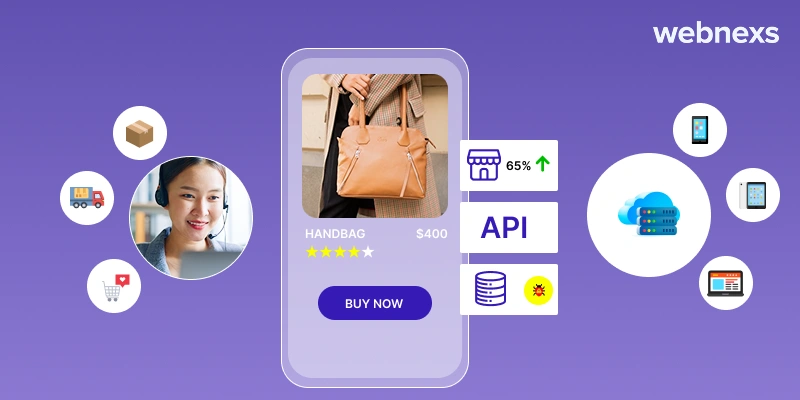
60% of eCommerce businesses say selecting a platform with scalability and integration support helps overcome traffic and operational challenges
1. Handling Traffic
The software platform needs to be scalable to a flexible degree to accommodate massive traffic and to enable the platform to be available to users at any time. E-commerce operators often have to deal with scalability to incorporate changes to handle such loads.
2. Outage
Susceptibility to shut down of service due to mistakes or omissions are common encounters, during such times, heavy loss of time and financial resources may heavily affect business.
3. Third-party integrations
Integrations with any third-party applications require API interoperability, this feature enables communication between software applications to deliver a seamless process of operation.
4. Database Management
From database setup and configuration to security compliance, all components are responsible for content optimization to convert sales online. Bugs and malfunctions are vulnerabilities as these will be handled by the platform owner.
5. Upgrades
Updates, data migrations, and rollbacks have the potential to cause disruption to the live operations. Gradual rollout and rollout planning are some of the techniques that can be deployed to enable seamless flow of operations.
6. Load Balancing
Traffic is distributed across multiple server networks to prevent overloading, eliminating associated problems such as downtime, slowed responses, and others. Insufficient redundant systems and inadequate monitoring are some of the attributing reasons.
Read more: Marketplace trends you need to know in 2025
Webnexs Ecommerce Website Builder Successful Case Study
One of the rarest and top-notch Japanese whiskies and casks retailer, presents a range of floral, fruity, and nutty notes, providing a subtle character, while smoky and woodsy notes deliver an intense flavor that enhances the overall character profile. All of these offer the best taste of Japanese whiskies, serving the niche market of Whisky enthusiasts.
This distinctive industry has its own exclusivity, which is taken over by that top Japanese whisky provider, which boasts a significant share of such a matchless Whisky character. Additionally, they also operate as an independent bottling company, managing all executions from cask acquisition to cask distribution. With an advanced network, they are successful cask brokers, thus democratizing this niche area to Whisky enthusiasts who take greater delight and stand in being cask investors.
Since 2018 they have been active in the market, initially, they were making an average monthly sales of $40,000, and kicking off with an impressive number has enabled them to compete fiercely in the market to be able to reach the 6-figure monthly sales they are generating currently.
They are catering to the US market predominantly which comprises a staggering 70-80% of its total market offering, owing to the substantial demand for Japanese whisky as they are limited in production. Secondly, a considerable share is accounted for by European countries, where it is similarly limited. They operate by managing two principal warehouses in Japan and the UK. To upscale their business, they wanted to revamp their online storefront to advance their existing website to reach their next milestone.
While on the lookout for the right technical and strategic expertise, they decided to partner with Webnexs – a White Label Service Provider to develop their custom E-commerce store. We began with creating a new technology to assist them in order fulfillment, starting with understanding their operations from scratch to develop a technology that is 100% compatible with their existing system of operations.
For this, an intranet was created to centralize and connect various logistics centers starting from the website to the warehouse for enhanced coordination and time efficiency in disseminating information as part of the communication of orders. Its benefits are not limited to this but also include establishing auto-communication and preventing bottle theft by matching BIN with the product number, thereby ensuring that consistency is maintained in order fulfillment and simultaneously eliminating ambiguity in product availability.
We ran a full spectrum of website enhancement, covering every component for a holistic advancement in functionalities and performance, stipulated to bring efficiency and effectiveness. We began with optimizing the website to rank in the search engine; this overarching technique also included technical SEO, where site architecture was designed to ensure navigability, improve page speed, and deploy XML sitemaps to ensure indexing was done precisely. Additionally, we optimized the Robots.txt file to determine indexable elements by the search engine, while utilizing HTTPS to ensure data had been encrypted with Transport Layer Security (TLS).
Furthermore, canonical tags were used to direct the crawlers to display the webpage that is intended when similar content is available across multiple pages. Moreover, an additional strategy for driving substantial traffic was leveraging On-page SEO elements that were entirely optimized to enhance rankings and attain greater visibility, thereby generating significant traffic loads.
Furthermore, graphics were designed to enhance user appeal and deliver a pleasant browsing experience, and aesthetic enrichments ensured seamless interaction with the site. Given these strategies, Google ad campaigns were also operated to enable targeted advertising and increase visibility to drive more traffic, and imminent results were observed to a certain degree, expediting lead conversions and the loop continued.
Advanced sets of technological stacks were employed to deliver the most promising results driven by efficiency. Here is the list of the stack:
Database Management System
- MYSQL
- Mongo
Backend Technologies
- Express.js
- Node.js
Scripting Language
- PHP
Content Management System
- WordPress
Cloud Storage
- AWS S3
All of this was together incorporated into the agile methodology, within which the Scrum framework was employed to deliver sprints as and when it is completed, where review and update can be integrated into the development process parallel to code deployment. This allows for greater flexibility in making alternations and can accommodate them to a greater extent when compared to the traditional waterfall method.
For their division of cask investment, they preferred to take it tech-driven, to enable investors to access up-to-date information and seamlessly let them equip themselves with all their investment particulars. Reciprocating their claims and demands, we suggested building an exclusive application called BaseApp, which primarily comprises specifics on the investment and provides wholesome knowledge on their shareholding. Additionally, an independent application was also developed to cater to the informational requirements of the investors.
Technical glitches did emerge, and comprehensive support was offered, addressing all concerns until the site was stabilized in its complete functionalities and operations. Resolution management has been meticulously executed, which has earned us credibility and a significant reputation.
The resulting outcome was that revenue started picking up gradually since the launch of its online storefront and currently generates a gross amount of $500,000 per month, this huge success in 7 years is attributed to the user-friendly interface which is intuitive and navigable, designed with utmost consideration to enable the users to swift through the website without any hassles. Besides that, speedier page load time and efficacy in performance have been optimized to derive maximum convenience and seamless usability. These factors have been instrumental in transforming the website into a robust platform that can significantly contribute to generating substantial sales revenue.
This case study demonstrates the success of a business when partnered with the right service provider. Online business growth is a crucial source of revenue generation and being an efficient channel to reach a wider audience and accelerate growth has revolutionized the way businesses operate.
Final Thoughts on Choosing the Best Site for Ecommerce
In conclusion, top ecommerce website builders are crucial in helping businesses establish and grow their online presence. Your choice of ecommerce website maker should align with your business requirements. For instance, if your focus is selling services, Shopify presents a compelling option. However, Webnexs stands out as our top-rated ecommerce website builder, surpassing competitors with its exceptional sales features and high-quality performance in the market.





31 Responses
Keep up the fantastic work on explaining the best ecommerce website builder for small business.
Wow wonderful top ecommerce web builder blog layout How long have you been blogging for you make blogging look easy The overall look of your site is great as well as the content
I wanted to take a moment to commend you on the outstanding quality of your blog. Your dedication to excellence is evident in every aspect of your writing on ecommerce website builder software. Truly impressive!
Thank you for sharing this insightful best ecommerce website builders article! I found the information really useful and thought-provoking. Your writing style is engaging, and it made the topic much easier to understand. Looking forward to reading more of your posts!
I would like to thank you for the efforts you’ve put in writing this easy ecommerce website builder blog. I am hoping the same high-grade web site post from you in the upcoming also. In fact your creative writing abilities has inspired me to get my own blog now. Really the blogging is spreading its wings fast. Your write up is a good example of it.
Your writing on ecommerce website building companies blog is not only informative but also incredibly inspiring. You have a knack for sparking curiosity and encouraging critical thinking. Thank you for being such a positive influence!
Thanks I have recently been looking for info about this subject e commerce website maker for a while and yours is the greatest I have discovered so far However what in regards to the bottom line Are you certain in regards to the supply
Your blog is like a beacon of light in the vast expanse of the internet for those who search for best e commerce website builders. Your thoughtful analysis and insightful commentary never fail to leave a lasting impression. Thank you for all that you do.
Normally I do not read article on blogs however I would like to say that this writeup very forced me to try and do so Your writing style has been amazed me Thanks quite great post on best online ecommerce website builder.
Thank you for this insightful post! I really appreciate the effort you put into creating such valuable content based on ecommerce website maker.
You have brought up a very excellent points, regards for the ecommerce website builder companies post.
Your ecommerce site builder reviews blog is a true hidden gem on the internet. Your thoughtful analysis and engaging writing style set you apart from the crowd. Keep up the excellent work!
I’m about to start my first ecommerce site, as the options are overwhelmed, now I’m in search of the best website builder for online store that’s beginner-friendly. Do you provide customized platforms for startups?
I just wanted to express my gratitude for the valuable insights you provide through your ecommerce builder reviews blog. Your expertise shines through in every word, and I’m grateful for the opportunity to learn from you.
Hello, I’m not a developer, so I need the best online store builder that doesn’t require coding but still gives me control over the shopping experience, especially the checkout flow and how products are displayed.
Hi, I’m planning to bring my physical store online and looking for the best ecommerce website builder. With the above comparisons, I have decided to create an ecommerce platform with you. Does your platform offer a complete package — including payment integration, inventory sync, shipping options, mobile responsiveness, and AI-powered recommendations?
Thanks I have just been looking for information about best website builder for ecommerce. Now I’m ready to create a best platform.
Hello, I was in need of information about ecommerce website building companies. Now I got a full guide which is helping me to start my ecommerce business right away.
Nowadays ecommerce website builders are the easy way to create a online store. I’m need of a best website builder for my online store. So could you briefly explain about your services.
Insightful article on best ecommerce website builders. I need to build a ecommerce platform just to target a specific region(a state). I’d like to learn more about your service.
Hello, I’m interested in building a ecommerce website for my company. To expand my company in the ecommerce industry also. Especially targeting the abroad countries.
Hello, I’m starting a simple ecommerce platform. Will you help me with best ecommerce website builder software?
I’m continually impressed by the depth of your knowledge and the clarity of your writing in best sites for ecommerce website creation.
Hi, in need of a best ecommerce platform with features like live shopping, AI integration and all the modern trends.
Hi, I need to build a ecommerce platform with a custom ecommerce solution. I’ll also be offering extra discounts and quarterly deals. So the platform should support peak traffic times too. Also I care about high security for the the shoppers in my site.
Hi, I’m in search of ecommerce website maker to transform my offline shop to online business. Will your ecommerce platform comes with all the features integrated as a pack?
I have worked with some of the best sites for ecommerce. But ended up with negative results. I would like to work with you for ecommerce business.
Hi, I’m interested in running a custom ecommerce solution for my online shoe based business. It needs to be the best commercial website. I need to know if its possible to integrate all my sales channels.
Hello team, looking to inquire about the pricing details regarding custom headless ecommerce solution for my business.
Thank you for the good writeup. I’m interested in service of ecommerce website building platform. However how could we communicate?
Hello, I’m interested in building a best online shopping platform specifically for selling car accessories. I’d like to learn more about your service.